|
|
|
Sort Order |
|
|
|
Items / Page
|
|
|
|
|
|
|
| Srl | Item |
| 1 |
ID:
086400
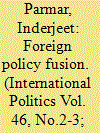

|
|
|
|
|
| Publication |
2009.
|
| Summary/Abstract |
Several tendencies in US foreign policy politics generated a new foreign policy consensus set to outlast the Bush administration. Three developments are analysed: increasing influence of conservative organizations - such as the Heritage Foundation, and of neoconservatism; and, particularly, democratic peace theory-inspired liberal interventionism. 9-11 fused those three developments, though each tendency retained its 'sphere of action': Right and Left appear to have forged an historically effective ideology of global intervention, an enduring new configuration of power. This paper analyses a key liberal interventionists' initiative - the Princeton Project on National Security - that sits at the heart of thinking among centrists, liberal and conservative alike. This paper also assesses the efficacy of the new consensus by exploring the foreign policy positions and advisers of President-elect Barack Obama and his defeated Republican rival, Senator John McCain, concluding that the new president is unlikely significantly to change US foreign policy.
|
|
|
|
|
|
|
|
|
|
|
|
|
|
|
|
| 2 |
ID:
180036
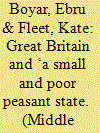

|
|
|
|
|
| Summary/Abstract |
Taking the Anglo-Turkish Trade and Navigation Treaty, concluded in March 1930, as its focal point, this article investigates the relations between Turkey and Britain after the signing of the Treaty of Lausanne and suggests that the failure of the British government to understand the fundamental importance of economic independence for the governing elite of the new Turkish republic, combined with its conviction that the Turkish economy was failing, undermined Britain’s ability to assess developments in the country and to position itself accordingly.
|
|
|
|
|
|
|
|
|
|
|
|
|
|
|
|
| 3 |
ID:
095283
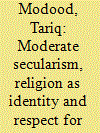

|
|
|
|
|
| Publication |
2010.
|
| Summary/Abstract |
Political secularism takes many forms but a fundamental distinction is between radical and moderate kinds. The latter is a genuine secularism and not just a failure to take secularism to its logical conclusion. The failure to appreciate this obscures the secularism that exists in western Europe. Namely, an accommodation of organised religion which sees it as a potential public good or national resource (not just a private benefit), which the state can in some circumstances assist to realise-even through an 'established' church. I adumbrate five types of reasons the state might be interested in religion: truth, danger, utility, identity and respect. The challenge facing such secularism today is whether it can be pluralised or multiculturalised, in particular whether it can accommodate Muslims. A ground for optimism is the respect that some people, especially some Muslims, have for religions other than their own.
|
|
|
|
|
|
|
|
|
|
|
|
|
|
|
|
| 4 |
ID:
067400


|
|
|
| 5 |
ID:
161059
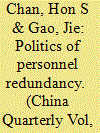

|
|
|
|
|
| Summary/Abstract |
This study provides an overview of the origin, importance and strength of the non-leading cadre system and argues that the system plays a key role in building resilience in China's bureaucracy. The non-leading cadre system is administratively and politically important because it makes the party-state bureaucracy more adaptable and fosters cohesion among the elite cadre workforce. Although the system may appear to have institutionalized redundancy, this study argues that this redundancy has the benefit of making movement between leading and non-leading cadre status possible. In other words, the non-leading cadre system provides the various levels of the party-state bureaucracy with the leverage to develop their own measures for resolving their own problems. Putting aside the deficiencies in implementation, the non-leading cadre system is likely to remain durable and will help to develop an agile and resilient personnel management system, at least in the short to medium term.
|
|
|
|
|
|
|
|
|
|
|
|
|
|
|
|
| 6 |
ID:
100193
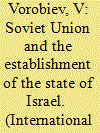

|
|
|
|
|
| Publication |
2010.
|
| Summary/Abstract |
ADDRESSING AN INTERNATIONAL CONFERENCE dedicated to the 65th anniversary of Victory in the Great Patriotic War, former Polish foreign minister Adam Rotfeld, * who co-chairs, together with MGIMO Rector Academician A.V. Torkunov, the Russian-Polish Group on Difficult Issues, cited the remarks that our head of government V.V. Putin made in Katyn on April 7, to the effect that the proportion of Russians killed in the war was nearly 80% of the total number of deaths - i.e., about 23 million people.
|
|
|
|
|
|
|
|
|
|
|
|
|
|
|
|
|
|
|
|
|